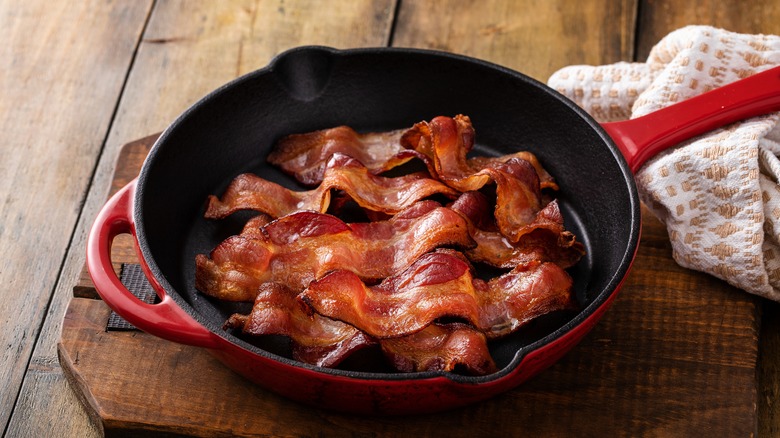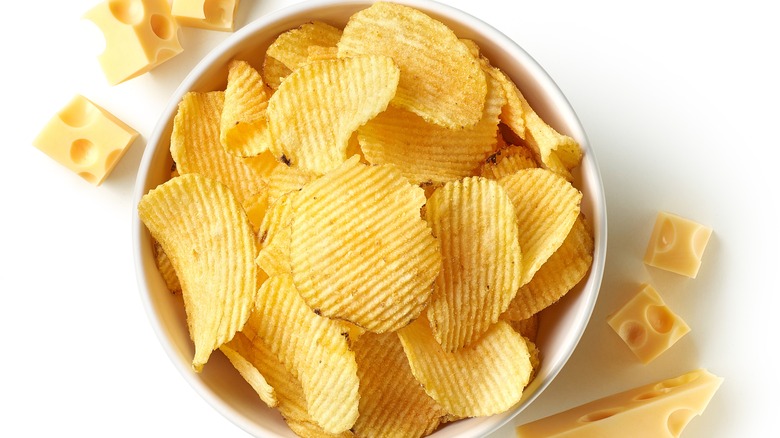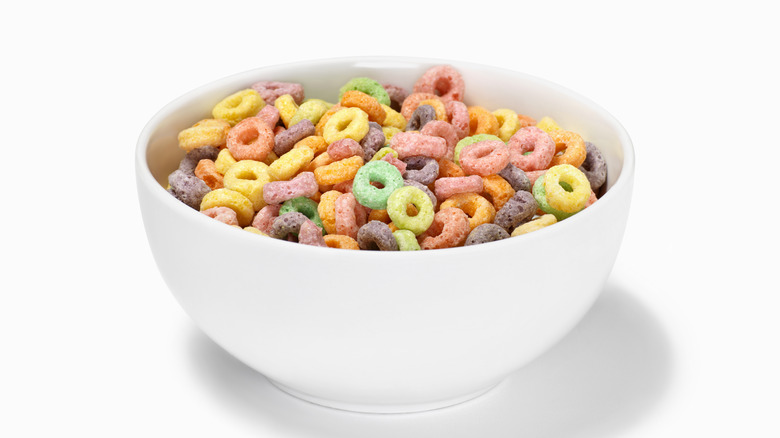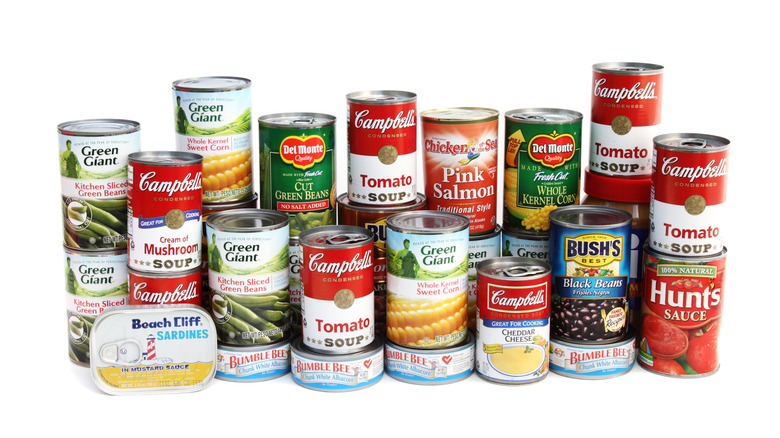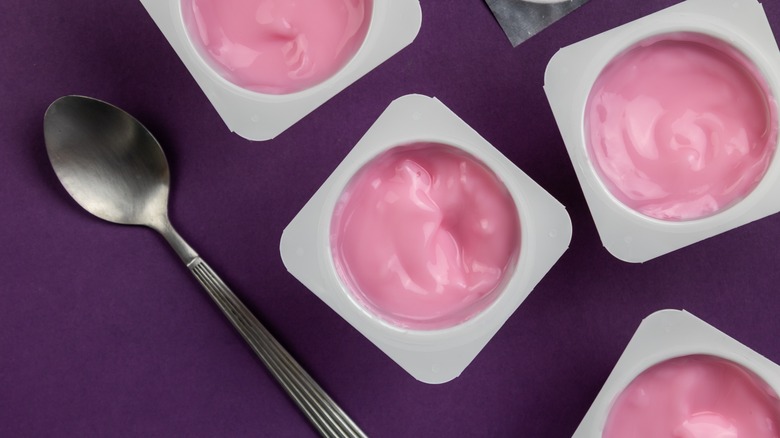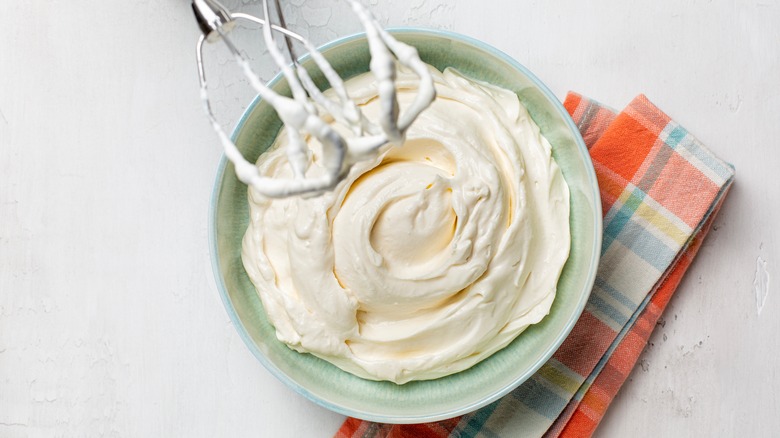20 Of The World's Unhealthiest Foods
Today, we have more food options than ever, with an unprecedented array of choices to suit every taste and preference. However, in a world of convenience and fast-paced living, our food choices often prioritize speed and ease over health and nutrition. Many of the foods we consume daily are not just lacking in essential nutrients but can also be harmful to our health.
One of the main culprits is processed or even ultra-processed food, which often contains high amounts of empty calories and sodium. Additionally, many of these foods are loaded with high levels of sugar, preservatives, and other additives to enhance flavor, texture, and shelf-life, all at the cost of our well-being. These unhealthy factors are a direct result of the processing methods used in their manufacture. From the grocery store food aisle to our own pantries, we should think twice before picking up these unhealthy foods and instead take time to consider healthier alternatives.
1. French fries
You're likely no stranger to these crispy, golden delights that tempt us at fast-food joints, diners, and restaurants around the globe. These beloved potato sticks, typically deep-fried to perfection, pack a caloric punch that can weigh on your health. To illustrate the impact of the deep-frying process, note that a single 100g baked potato contains about 93 calories and 0.13 grams of fat, but if you deep-fry the same potato as fries, it will increase the calorie count to 310 and the fat content to 14.7 grams.
Deep-frying significantly increases the calorie count by causing potatoes to lose water and absorb fat from the oil, also leading to higher levels of unhealthy trans fats and saturated fats. A healthier alternative is to prepare your own fries from scratch and use an oven or air fryer instead of deep-frying them.
2. Soda drinks
Despite their refreshing fizz. The evidence is overwhelming in linking soda drinks with obesity and an increased risk of developing type 2 diabetes. This is mainly due to their high sugar content — a typical can of soda contains about 37 grams of sugar, which is equivalent to over 9 teaspoons.
Soda drinks have also been established as one of the leading causes of tooth decay due to their sugar and acidic nature, which can erode tooth enamel over time, leading to cavities. The phosphoric acid in most sodas has also been linked to lower bone density and an increased risk of osteoporosis. Remember too, that diet sodas are no better, with their own set of health concerns stemming from their artificial sweeteners. It's important to consume soda in moderation and consider healthier alternatives such as water, herbal teas, or flavored sparkling water.
3. Processed meats
Your sizzling slice of bacon in the morning may seem like a convenient staple, but processed meats come with a health warning. Items such as bacon, sausage, hot dogs, and deli meats, are among the world's unhealthiest foods due to their high levels of salt, saturated fats, and additives.
Processed meats often go through curing, smoking, or salting processes to preserve them and enhance their flavor, and these significantly increase the sodium content of the meat, increasing the risk of high blood pressure and other cardiovascular diseases. Moreover, processed meats often contain nitrates and nitrites, as preservatives and to add color and flavor. These salts are suspected carcinogens, potentially linked to an increased risk of cancer, particularly colorectal cancer.
While the occasional indulgence may not pose a significant health risk, regular consumption should be limited. Opting for leaner cuts of meat, such as turkey or chicken breast, and preparing them at home without added salts and preservatives can be a healthier alternative.
4. Candy bars
Candy bars and sweets seem like small indulgences, but their high sugar contents and calories add up, contributing to a number of health issues. One of the main reasons why is their high sugar content — a typical candy bar can contain around 17 grams of sugar, mostly refined sugars that are quickly digested and fail to provide a feeling of fullness, leading to cravings for even more sweets. Excessive sugar consumption can also contribute to insulin resistance, which is a key factor in the development of type 2 diabetes.
It's okay to occasionally enjoy your sweet treats, but it's important to be mindful of how much you consume. Beyond their ability to satisfy a sweet craving, candy bars and other sweets offer little to no nutritional value. Choosing healthier alternatives like fresh fruits or dark chocolate can satisfy your sweet tooth without the negative health effects.
5. Potato chips
Potato chips are everywhere. You can have them with your burger, during a movie marathon, at parties, or even on the go. But as much as we love them, potato chips are also one of the unhealthiest foods out there. They're high in fat from being fried, and are also loaded with salt, to enhance the chips' flavor, as well as preservatives to extend their shelf life.
An 8-ounce bag of plain potato chips can contain up to 1,200 milligrams of salt, making a significant fraction of the World Health Organization's recommended daily maximum of 2,000 milligrams — it's important to note that lower estimates come from serving sizes of just seven to fifteen chips, and it's easy to consume way more than that in a single sitting. Excessive salt can lead to immediate effects too, such as thirst, bloating, and a rise in blood pressure. Opting for unsalted or lightly salted chips is a healthier choice worth trying.
6. Breakfast cereals
Many breakfast cereals are advertised as a healthy breakfast option, promising essential nutrients to start your day off right. However, the reality is that many of these cereals contain as much sugar as candy. A single serving of cereal can contain as many as 18 grams of sugar, or about 5 teaspoons, which is a staggering amount compared to the recommended daily maximum of 9 teaspoons for men and 6 teaspoons for women.
Cereals are often made with refined grains, which gives them a finer texture and improves shelf life, but also strips away natural fiber and nutrients. As a result, they are often low in fiber and protein, which are important for keeping you full and satisfied. For a healthier alternative, choose whole-grain cereals with minimal added sugar.
7. Energy drinks
Energy drinks, with their flashy packaging and promises of instant vigor, have become a modern-day staple for those seeking a quick pick-me-up. However, the quick burst of energy comes at a price. Energy drinks have a high caffeine content, with most containing as much or even more than a cup of coffee. That alone can lead to jitteriness, anxiety, and digestive problems, especially when consumed in large quantities. Alongside caffeine, energy drinks contain various other ingredients, like taurine, guarana, and ginseng, among others, which can amplify these side effects.
Additionally, energy drinks are often loaded with sugar or artificial sweeteners to enhance their flavor, which is not always the case with coffee. One serving of energy drinks can contain 29 grams of sugar, or about 7 teaspoons, which is more than the sugar content of most Halloween candies.
8. Shark meat
Shark meat's exotic appeal has made it a cherished delicacy in various parts of the world, though its popularity depends on personal preference. Its taste varies depending on the method of preparation, with some likening it to chicken or alligator.
Despite its allure, shark meat is considered unhealthy due to its potential to contain high levels of mercury and other contaminants. Sharks are long-lived predators at the top of the marine food chain, making them susceptible to accumulating mercury from the fish they eat, meaning the shark's meat can contain large amounts of it. This can have toxic effects on the nervous system of those who eat it, especially in pregnant women and young children.
9. Processed pastries
The health risks posed by processed pastries aren't as pretty as their colorful appearance or enticing fillings. Whether you prefer colorful cakes or breads overflowing with fillings, behind the indulgence lies an ugly danger in the form of sugar, unhealthy fats, and refined carbohydrates.
Pastries are often packed with added refined sugars, heavily processed, which give them their sweet and irresistible taste but also make them high in calories and low in nutrients. Another concern is their high levels of refined carbohydrates. These carbs are quickly broken down by the body into sugar, leading to a rapid spike in blood sugar levels.
While it's okay to indulge occasionally, regularly consuming processed pastries, whether for breakfast or as dessert after meals, can become a problem. Choosing healthier alternatives, such as homemade baked goods made with whole grains and natural sweeteners, can provide a healthier option without compromising on taste.
10. Instant ramen
Taking just a few minutes to prepare, instant ramen is a go-to choice for a quick and easy meal. However, the manufacturing process that makes them so convenient has also caused instant ramen to contain high levels of sodium and unhealthy fats.
A typical serving of instant ramen can contain up to 1,500 milligrams of sodium or more, which is close to the recommended daily limit of 2,000 milligrams. Additionally, the noodles are pre-cooked and then often deep-fried before packaging, increasing the levels of unhealthy fats. Another consideration is its lack of nutritional value. One pack of instant ramen noodles contains up to 380 calories but is low in essential nutrients like vitamins, minerals, and fiber. To make your instant ramen a more balanced meal, consider adding ingredients that will enhance its nutritional profile.
11. Margarine
Margarine was first introduced as a cheaper alternative to butter, then marketed as supposedly healthier because it's plant-based and is low in saturated fats. However, there are many reasons margarine may even be unhealthier than butter.
For one, margarine is highly processed, using a variety of trans fats to give its solid but spreadable texture. Consuming trans fats can increase levels of bad cholesterol in the blood, leading to an increased risk of heart disease, stroke, and other health issues. Additionally, many margarine products contain additives and preservatives to improve their taste and shelf life. These additives can include artificial colors, flavor compounds, salt, and sweeteners. Opting for spreads made from olive oil or other healthy fats, or using small amounts of butter or ghee, can help reduce your intake of these unhealthy ingredients.
12. Fast food
It's no secret that fast food owes its convenience and flavor to a variety of unhealthy ingredients and cooking methods. From deep-fried delights to sugary treats, fast food is often laden with unhealthy fats, excessive sodium, and refined sugars. These ingredients not only add flavor and texture but also contribute to the addictive nature of fast food, making it hard to resist.
One of the main reasons behind the unhealthiness of fast food is its high levels of unhealthy fats, particularly trans fats and saturated fats. These fats are commonly found in fried foods like french fries, chicken nuggets, and onion rings. Fast food is also notorious for its sky-high sodium content. A study in the Journal of the American Medical Association revealed that 55% of meals at fried chicken chains had more than 2,300 mg of sodium, which is more than the recommended daily limit. Making healthier choices, such as opting for grilled or baked items, can help mitigate some of the negative effects of fast food on your health.
13. Milkshakes
While milkshakes may not be as popular as they once were, their sweet, creamy allure continues to make them a beloved indulgence across the world. However, behind their nostalgic charm lies a truth that might leave a bitter taste — milkshakes are loaded with high levels of sugar, unhealthy fats, and calories.
Many milkshakes are made with flavored syrups, sugary sauces, or sweetened powders, all of which can add a significant amount of sugar to the drink. This is made worse by the high levels of unhealthy fats found in the whole milk, ice cream, or whipped cream used in their preparation.
All of this contributes to their high calorie content. A typical milkshake can contain up to 500 calories, depending on the size and ingredients used. Consuming too many calories can lead to weight gain and other health issues. Opting for smaller sizes or choosing low-fat milk with natural sweeteners can help make milkshakes a healthier indulgence.
14. Canned soup
Canned food is a marvel of modern convenience, providing an array of options with long shelf lives. However, some foods are simply better enjoyed fresh rather than canned, and soup is a prime example. While canned soups offer a quick and easy meal solution, many are laden with excessive amounts of salt, used both as a preservative and a flavor enhancer. Some canned soups contain more than 1,000 milligrams of sodium per serving, which is already half of the recommended daily limit.
In addition to high sodium levels, canned soups can also lose some of their natural nutrients during processing, particularly water-soluble vitamins and fibers. That said, not all canned soups are created equal — it's important to read labels carefully to see which canned soups are worth buying and which ones you should avoid.
15. Processed cheese
Cheese is a beloved and familiar staple found in countless daily meals, from sandwiches to snacks. Despite its convenience and burst of flavor, it's important to be mindful of the kind of cheese you consume. Processed cheese, such as American cheese, has been altered to change its texture and flavor. To make processed cheese, natural cheese is melted and blended with emulsifiers, preservatives, and other additives to create a smooth texture, vibrant color, and distinctive flavor. However, these additives can also lead to higher levels of calories, salt, and fat compared to natural cheese.
Processed cheese is often used in fast food and packaged products due to its convenience and long shelf life. To make a healthier choice, consider opting for natural cheese from the deli section of your supermarket.
16. Packaged juice
Juice boxes, often marketed as a convenient and healthy beverage option, are a popular go-to choice for many. However, some may actually be just as unhealthy as other drinks like soda, especially when it comes to sugar content. Aside from the concentrated natural sugar from the fruits, many boxed juices also contain added sugars or sweeteners to enhance their flavor. One cup of packaged juice can have up to 21 grams of sugar, or more than 5 teaspoons.
Additionally, packaged juice is often lacking in fiber, making it far less healthy than whole fruits. Fiber helps slow down the absorption of sugar in the body, preventing spikes in blood sugar levels. Without it, boxed juice can cause a rapid increase in blood sugar levels, leading to energy crashes and cravings for even more sugar.
17. Store-bought salad dressing
If you love salad as a healthy meal choice packed with fresh vegetables and nutrients, think twice before you ruin its healthiness with store-bought salad dressing. Many commercial dressings are high in saturated fats, especially the creamy ones like ranch or blue cheese. These fats can increase levels of bad cholesterol in the blood, leading to an increased risk of heart disease and other health issues.
Store-bought salad dressings also contain a lot of calories. French dressing, for example, has 67 calories per tablespoon, and chances are you're eating way more than that per meal. They may also contain preservatives and additives to improve shelf life and enhance flavor, which pose their own health risks. Making your own simple and quick homemade salad dressing with natural ingredients is always a healthier choice.
18. Sweetened yogurt
Yogurt has been a healthy food option for centuries, cherished for its creamy texture and probiotic benefits. However, modern commercial yogurts often stray far from this standard, loaded with sugars and additives that can negate their healthful properties.
Many flavored yogurts contain added sugars to enhance their taste, with some varieties containing as much sugar as a dessert, at more than 10 grams per 8-ounce container for plain yogurt and even more for flavored ones. While sweetened yogurt can be enjoyed in moderation as part of a balanced diet, it's important to be mindful of its sugar content and choose plain or Greek yogurt as a healthier alternative. Adding fresh fruit or a drizzle of honey can also help sweeten plain yogurt without the excessive sugar content of flavored varieties.
19. Instant mashed potatoes
Instant mashed potatoes are made from dehydrated potato flakes that are reconstituted with water or milk, resulting in a smoother and less chunky texture compared to traditional mashed potatoes. To make up for the lack of flavor and texture, they're often seasoned with a high amount of salt and other additives like oils, emulsifiers, and stabilizers to make them tastier and creamier.
Instant mashed potatoes contain over 200 calories in one cup, which is significantly more than fresh potatoes or homemade mashed potatoes, especially due to the saturated fats added during processing. For the most nutritional benefit, it's recommended to opt for fresh potatoes and prepare them at home. This way, you can control the ingredients, retain more fiber and nutrients, and also avoid the excessive amounts of salt and unhealthy fats found in many instant varieties.
20. Heavy whipping cream
Whipping cream makes everything better with its rich, velvety texture. However, this tasty treat comes at a cost to your health, as heavy whipping cream is packed with saturated fats and calories. Heavy whipping cream is made from the high-fat cream skimmed from the top of milk, making it one of the richest sources of saturated fat in any diet.
When it comes to calories, just one tablespoon of heavy whipping cream can contain around 50 calories, with fewer nutrients than other dairy products like yogurt. So, while heavy whipping cream can add richness and flavor to dishes, it's important to consume it in moderation and to opt for lighter alternatives like lower-fat dairy products.



